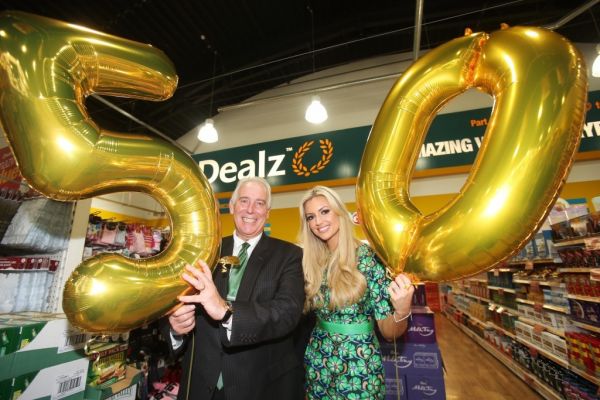Poundland chief executive Jim McCarthy has announced that he now plans to open as many as 100 Dealz outlets in Ireland, up from a ‘ceiling’ of 70 a couple of years ago. But what is driving the company’s renewed optimism in the Irish market? Stephen Wynne-Jones met him.
It may be a fairly miserable day, weather wise, in the capital, but as the giant balloons adorning the entrance to West End Retail Park in Blanchardstown will tell you, it’s not all doom and gloom. Dealz, operated by Poundland in the UK, is celebrating its fourth birthday, and while it seems like only yesterday that Checkout first met with the team behind the chain, a lot has happened in the meantime.
Four years on from its first ‘grand unveiling’, Dealz has not only flourished, it has exceeded even Poundland’s expectations. In November, announcing its half year results, Poundland said that it was updating its Dealz store targets for Ireland, from 70 to 100, following internal research that ‘identified substantially more locations’. Having just opened its fiftieth store, on Dublin’s Thomas Street, a further 20 Dealz outlets are set to open in Ireland next year. No wonder Poundland chief executive Jim McCarthy is beaming, despite the rain.
Optimistic View
“When we first came to Ireland, we thought 50 stores would be the maximum that the market would take,” he explains. “That’s proven to be wrong. We had a really good run here with consumers and we upped that target to 70. We now believe that we may be able to get up to 100 stores here, double what we originally thought. I think that really is a reflection of the enthusiasm that the Irish consumer has shown to us.
The group’s expansion here has also had an impact on its sales performance: according to Poundland’s half-year results to 27 September, sales were up 5.6% on a constant currency basis, with the group adding a net 52 new stores to its portfolio on both sides of the Irish Sea.
Expansion Plans
While Dealz established itself in Ireland in the midst of a downturn, when available sites were plentiful, further expansion may prove more difficult - particularly as rents increase. McCarthy is bullish about the group’s prospects, and believes its already strong portfolio will help it acquire additional locations.
“Back in September 2011, when we launched our first shop, in Blanchardstown, the property market was at its lowest,” he explains. “In a way, for us, that was really helpful, because our costs were low - which is symptomatic of a discount retailer - and our entry cost was lower than it otherwise would have been. From the outset, we were competing with people who had higher rent and smaller premises. We had a competitive advantage.
“However, we now have some economies of scale that we need to consider. For landlords, we are a reliable tenant. We pay our rent on time, and in full, and we’re a cash-generative business - we’re able to converse and agree with landlords on a commercial basis, which is reflective of our value.
“I think that another thing that helps landlords, particularly if they have a shopping centre, is that they know that if they open a Dealz outlet, it actually brings more customers to the centre. Landlords now understand that if Dealz occupy, the chances of them letting other sites in the vicinity are increased.”
Inevitably, as the Dealz empire expands, so the available sites will vary - while some Dealz outlets, like the Blanchardstown store we are standing in now, have almost a ‘warehouse’ feel, others are akin to convenience stores. Does McCarthy believe that the Dealz proposition can work as effectively in smaller locations?
“I think we can,” he says. “Our sweet spot is 6,000 square feet, but we can do 3,000 square feet very effectively, because the rent and the associated costs are less with these sort of sites. At the moment, we have a number of smaller outlets in our portfolio, and they are performing very strongly - so I would certainly believe that growth in the future will be driven by a combination of smaller and larger stores.”
Competitive Edge
While Dealz established itself in Ireland in the midst of a downturn, the fact that it is still in growth amidst a rosier economic outlook is an indication that consumers are still voting with their wallets. As McCarthy explains, the retailer doesn’t spend too much time watching what its competitors are doing.
“Our attitude is simple. We believe that if we deliver amazing value every day, and that it is a genuine, amazing value in contrast with other retailers, that is sufficient. We don’t need to focus on any one competitor, we consider everybody potential competition.
“We don’t focus on any one competitor as a benchmark that we have to perform against. We let the customer make their own minds up. If they decide they don’t like a particular product, or want it in a different format, we can deliver that, and restore the value once more.”
Exchange Rate
Unlike its UK-based Poundland operation - where the £1 price point is pretty much fixed, except in certain circumstances - Dealz has adopted a multiple price point strategy in the past couple of years, enabling it to offer a wider range of stock. However the €1.49 price point remains at the core of the business, with more than 90% of products available at this level.
Maintaining a steadfast price point can present challenges, however, given the fragility of the currency exchange situation between the Sterling and the Euro. How do these currency movements impact the business’ bottom line?
“It’s certainly a challenge,” says McCarthy. “However, what I can say is that even with the adverse movement in the exchange rate, we are able to maintain our €1.49 price point - it’s very important that we do so. Any increase in price without a similar increase in pack size would go against our promise to offer ‘amazing value’. But if you’re buying in euros, and selling in euros, as is increasingly the case with us as we expand, you can create a natural hedge.
“We have a very lean model and by keeping our cost-base tight, and increasing the volumes, we’re able to justify further expansion and that expansion is profitable expansion.”
Possible Obstacles
Of course, as any retailer gets bigger, there is the opportunity that cannibalisation may occur. Plans to open 100 stores are markedly different from the group’s initial strategy to open 50, and indeed in Dublin city centre, it will need to ensure that any future store openings do not take away from another’s business. How conscious is McCarthy of this possibility?
“What we find is that it depends on where the stores ares situated,” he says. “In city centre locations, it’s not unusual to see three or four convenience stores in a square kilometre of space, all competing with each other. It really depends on the pedestrian traffic flows.
“In a city like Dublin, if you’ve got a road splitting another road, the pedestrian flows can be different, so you can quite happily make money in both stores. In Birmingham, for example, we have three stores located less than a kilometre from each other, and yet the money we are taking out of those three stores is unreal because they are serving different catchment areas. I think that it’s about location rather than how many shops you have - it’s about which catchment ares you are serving and why.”
Further Growth
As well as bolster its Irish store count, Dealz is also looking to expand its Spanish operations, which now total ten stores, with a view to possibly entering new territories in the years to come.
“When we opened our first store in Torremolinos, we said that it was a two year trial,” says McCarthy. “We’re about 16 months in to that, so we’ve got another eight months to do. We are optimistic about the future of our European business and we have to prove that in Spain to start with. The secret is to get that rolling and then start exploring a second market, which we haven’t dived into yet. We know where we’re going, but I can’t confirm it just yet.
“Our first priority, however, is to learn. Ireland, because of the way that the Irish consumer behaves, is probably easier to understand - customer preferences here are not unlike those of the UK consumer. In Spain, there are some significant differences: when consumers go shopping, what brands they buy, what sort of space and layout works best. It has been wonderful to learn all this over the past 16 months, and we are now applying those learnings in some of the existing stores. Our future stores will certainly benefit from that.
In fact, such has been the growth of the group that one leading analyst, Clive Black of Shore Capital Stockbrokers has suggested that Poundland could be the next iteration of the Primark model, looking to all of Europe as its potential market. “I’ll take that as a huge compliment,” says McCarthy.









